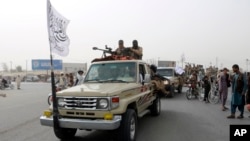The Taliban's "successful" offensive against the Islamic State branch in Afghanistan, IS-Khorasan, has "significantly degraded" its capability and steadily decreased large-scale attacks against civilians, according to a senior US envoy.
Tom West, the U.S. special representative for Afghanistan, shared the assessment during a Tuesday seminar at the nonpartisan Stimson Center think tank in Washington.
"They have a very aggressive violent offensive ongoing that has significantly degraded ISKP capability," West said, using an acronym for IS-Khorasan. "I think it's notable that since early 2023, Taliban raids in Afghanistan have removed at least eight key ISKP leaders, some responsible for external plotting."
West said the counterterrorism actions had led to a "steady decrease" in attacks against Afghan civilians.
"There were horrific attacks largely against the Hazara population, but we have not seen a return to those sorts of attacks since then," he added.
But the American envoy warned the Tehrik-i-Taliban Pakistan, TTP, "is posing the greatest threat" to regional stability. "We see a very significant increase in (TTP) attacks directed at Pakistan," West said.
The militant group, also known as the Pakistani Taliban, is listed as a global terrorist organization by the United States. It is waging terrorist attacks in neighboring Pakistan and operating out of Afghanistan sanctuaries.
Pakistani officials say TTP has intensified cross-border attacks since the Taliban returned to power in Kabul two years ago. The violence has become a daily routine and has reportedly killed more than 1,500 Pakistanis, including civilians and security forces, mostly in districts near or on the Afghan border.
The TTP leadership has publicly pledged allegiance to Hibatullah Akhundzada, the reclusive supreme leader of the Afghan Taliban. The militant group emerged in Pakistani border areas in 2007 and fought alongside the Taliban against the U.S.-led NATO troops in Afghanistan.
"They became allies of the Taliban during the war. They were financial supporters, logistical supporters, and operational allies as well. I think the ties between them are quite tight," West said.
The U.S. envoy declined to comment on Pakistani allegations that TTP attacks are taking place with the approval of Afghanistan's Taliban authorities.
"As far as whether the Taliban are supporting TTP attacks against Pakistan, that's a tough one and probably gets beyond what I am able to talk about publicly. It's no secret that this is the issue that dominates Pakistan's engagement with the Taliban at the moment," West stated.
The Taliban reject allegations they are allowing any group, including TTP, to use Afghan soil to threaten the security of Pakistan or the region at large.
For their part, officials in Islamabad say they have formally shared evidence with Kabul about the presence of TTP leaders and fighters in Afghanistan and their use of the country to launch terrorist attacks against Pakistan.
The tensions over rising terrorism were partly behind Pakistan's decision to shut the main border crossing with landlocked Afghanistan a week ago.
The busy Torkham transit point for trade and travelers remains closed, stranding hundreds of trucks carrying commercial goods and thousands of passengers on both sides and deteriorating relations between the two countries.
West also noted at Tuesday's seminar that al-Qaida was at its "historical nadir" in Afghanistan and Pakistan.
"Their ability to threaten the U.S. from Afghanistan and Pakistan is probably at its lowest point since the group relocated to Afghanistan from Sudan in 1996."
The United States and its allies withdrew all their forces from Afghanistan in August 2021, just days after the then-Taliban insurgents took control of the country from a U.S.-backed government in Kabul. The foreign troop departure ended nearly two decades of U.S. involvement in the Afghan war.











